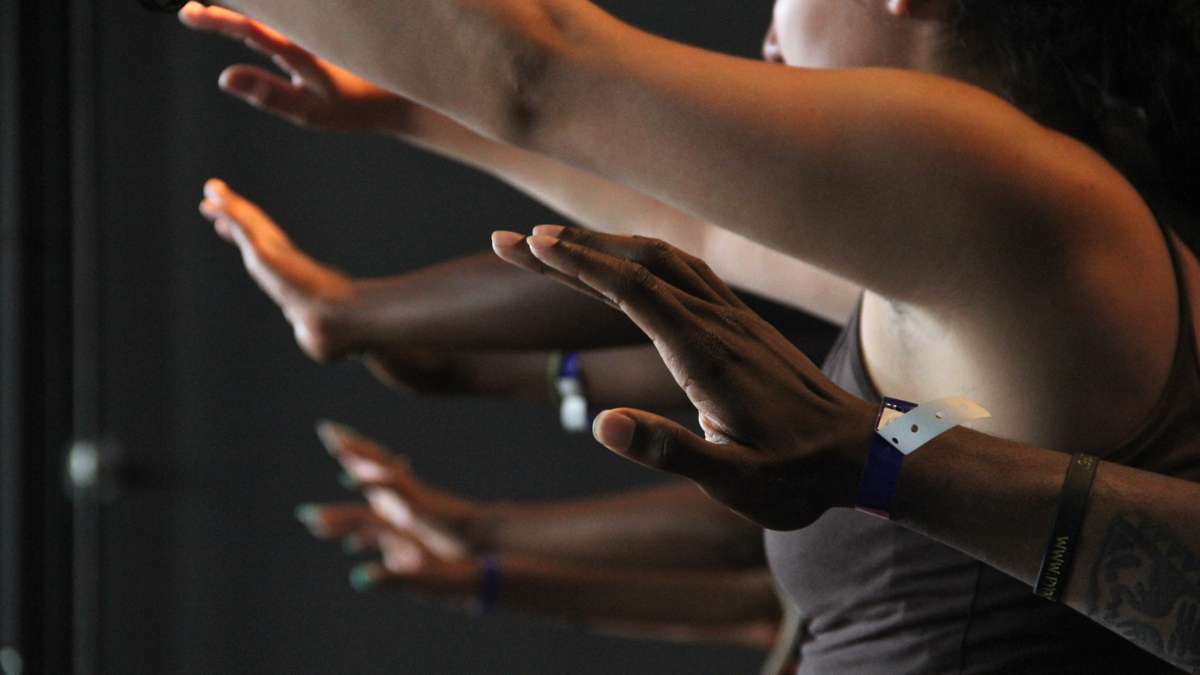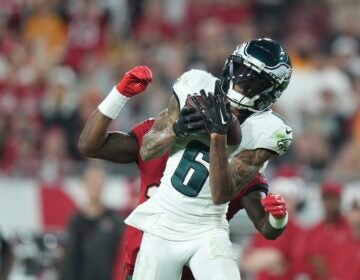Brave new voices ring out for poetry competition in Philly [photos]
ListenAbout 450 young poets from around the country are in Philadelphia as part of the 17th annual Brave New Voices competition and conference. Fifty teams from as many cities around the country will face off in a tournament of performances in 10 venues around the city.
The Philadelphia team was assembled by Philadelphia Youth Poetry Movement, a year-round poetry workshop and mentoring program that has won the Brave New Voices Grand Slam twice – in 2007 and 2011.
“The competition is second to building a family,” said Nayo Jones, 19, a member of the 2013 and 2014 PYPM teams. “The first thing we want to do is build a network of other poets. The competition fades away, but the group of people you become friends with, you will have them for way past the competition.”
During the first round of performances Friday morning, the Philadelphia team faced off with teams from Dallas, Los Angeles and Richmond, Va.
The poems – most of them angry – dealt with gun violence, body issues, absentee fathers, and racism. The performances are heavily rhythmic, sometimes with several poets onstage trading lines, often punctuating phrases with synchronizing voices.
Listen to a piece performed here. But be warned.
The following audio clip contains strong language.
Surrounded by support, emanating inspiration
A lone, young woman from Richmond performed her poem about alcoholism and addiction in her family. She wept as she described her dying grandmother still smoking a pack a day.
About a hundred people in the audience – her competitors – held their hands outstretched in front of them, a supportive gesture unique to youth poetry performances that suggests the audience is physically propping her up to keep her going.
She kept going, all the way to the end, as did her tears.
“It’s virtually impossible — no, it’s literally impossible to sit in here and not be inspired,” said Perry “Vision” DiVirgilio, the coach of the Philadelphia team. “If you can sit with these young poets being honest – more honest than adults – and not be inspired, check your pulse.”
The team has been working six days a week since April on poems and performances, DiVirgilio said. That kind of commitment sets an example for small cities with untested poetry programs, said Hodari Davis, the producer of BNV.
“A lot of poets in local communities feel isolated, like they are the only ones who write poems,” said Davis, also the program director of the competition’s parent company, Youth Speaks, Inc. “They use poetry as therapy for the other challenges in their lives. When they come together as a large community, they feel they have entered a world of like-minded people.”
That supportive environment allows young poets to explore intimate issues, like weight, anxiety, and menstruation
“There are so many things completely wrong with my uterus,” proclaimed Shaneka Briggs of the Philadelphia team, from the stage at the Fringe Arts Building. “For one, it’s called a ‘uterus,’ like an exotic bird in the Galapagos Islands.”
“So much love, so much light. Everyone was clapping for everybody,” said Ainye Clark, a recent graduate of KIPP DuBois Collegiate Academy, now entering Rosemont College. “They didn’t let ego get in to the way. They told the truth, and people responded to it.”
Poetry offers solace, life skills
The Brave New Voices national poetry slam is not the climax of the Philadelphia Youth Poetry Movement’s year. It holds free, weekly writing workshops at the Painted Bride in Old City year-round, and produces its own Slam League, a poetry competition featuring talent from 20 regional high schools.
“No matter how much privilege a young person has, there are always personal issues that goes on,” said Greg Corbin, founder of PYPM. “Poetry gives them an outlet – the ability to heal, the ability to reflect, and that important life skill: thinking things through before they act.”
The Friday bouts advance 16 teams to the evening semi-finals, which in turn produce just four finalists. Those finalists will compete at the grand slam on Saturday night at the Annenberg Center in the University of Pennsylvania.
The ultimate winner of the grand slam receives no prize — no cash, not even a trophy.
“They get bragging rights,” said Davis. “The trophy is to get to speak four poems on the final stage.”
WHYY is your source for fact-based, in-depth journalism and information. As a nonprofit organization, we rely on financial support from readers like you. Please give today.

















